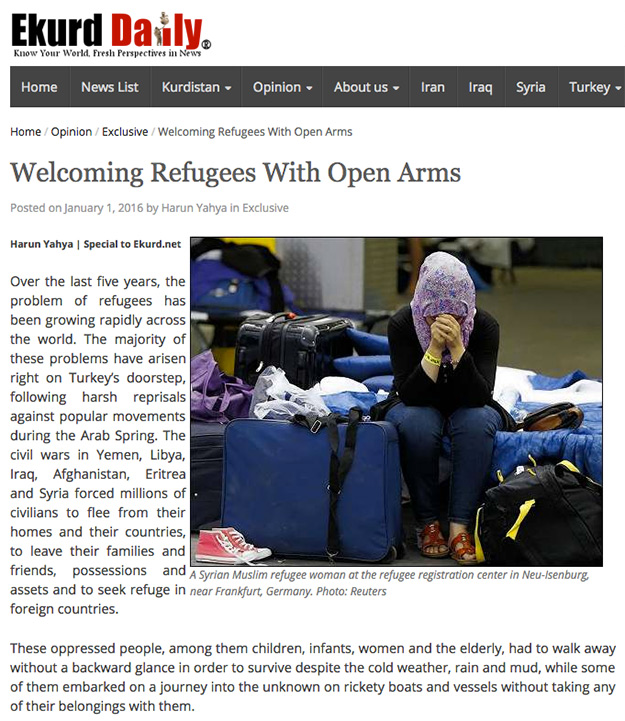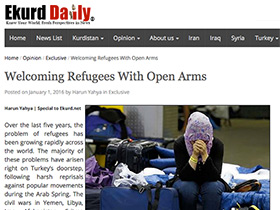
Over the last five years, the problem of refugees has been growing rapidly across the world. The majority of these problems have arisen right on Turkey’s doorstep, following harsh reprisals against popular movements during the Arab Spring. The civil wars in Yemen, Libya, Iraq, Afghanistan, Eritrea and Syria forced millions of civilians to flee from their homes and their countries, to leave their families and friends, possessions and assets and to seek refuge in foreign countries.
These oppressed people, among them children, infants, women and the elderly, had to walk away without a backward glance in order to survive despite the cold weather, rain and mud, while some of them embarked on a journey into the unknown on rickety boats and vessels without taking any of their belongings with them.
The United Nations High Commission for Refugees (UNHCR) reported that the total number of refugees in the world reached 60 million at the end of 2014.
Sixty million people were forced to migrate to a different land, leaving behind their homelands, the lands where they were born and raised and everything else they had…
When it comes to refugees, we undoubtedly instantly think of the 4 million people who have migrated from Syria, where the civil war has shown no sign of slowing down in the last 5 years. Women and children account for 75% of this figure. More than 7 million Syrian people have also been forced to leave their homes and migrate to another city. In other words, they have become internally displaced. Almost half the country’s prewar population of 22 million people have thus been forced to migrate, turning Syria into the main player in the largest refugee crisis in the world.
Yet another people who have left their homes due to civil war and hunger are the Somalis. There are more than one million Somalian refugees living scattered among various countries, while the number of Afghan refugees who have escaped from war and sought refuge in numerous countries stands at 2.4 million.
At this moment, one and a half million Rohingya Muslims from Myanmar with a history of persecution in the state of Arakan are trying to survive at the hunger threshold in Bangladesh. More than 240,000 Rohingya Muslims who have become refugees in their own homeland are in the same situation as millions of Syrians. There are 120,000 refugees across the country’s border with Thailand. Hundreds of thousands of Rohingya have refugee status in Pakistan, Saudi Arabia, Malaysia, Thailand and various European countries.
The problem of refugees has gradually grown, not only in Syria, Afghanistan, Somalia and Myanmar, but also in Iraq, Sudan, Yemen and many other countries. Some of these millions of people forced to embark on unknown journeys to escape from persecution, oppression and violence have lost their lives en route, while a small percentage who finally arrive at their destination may encounter inhuman treatment they do not deserve. Boats have sunk after being harpooned while fighting the waves. Children and toddlers experience terror on the freezing waters, their tiny bodies later washing up on the shore.
Hundreds of thousands of refugees trying to escape the fighting in the Middle East are attempting to reach Europe by crossing the Aegean Sea and the Mediterranean. However, thousands of them lose their lives on the way to Europe. According to official figures for 2015, 3,601 refugees, including women and children, have drowned. However, the real number of those who have lost their lives is much higher.
European Union (EU) countries now have no option but to take more responsibility on the issue of refugees. Prior to the escalation of the crisis the EU used to send refugees, in contravention of European Court of Justice rulings regarding refugees intercepted at sea, back to countries where there are ongoing civil wars, such as Northern Libya, under operations conducted by the European Union Agency Frontex. The policy pursued by the EU in that period was to transform the union into a fortress surrounded by high security walls, as if building a new Berlin Wall around itself through the operations conducted by Frontex.
The current state of affairs reveals that all of these precautions have been useless. Refugees who have been prevented from seeking asylum in EU countries through legal means often try to cross the Mediterranean with the help of human traffickers. Yet they suffer the most awful tragedies, and everyone has witnessed that the situation has now turned into a humanitarian and ethical crisis.
However, we have a human duty to look out for people who are vulnerable for any reason, regardless of their religion, sect or ethnicity, to protect them and to strive for the elimination of persecution in the world. The only thing to be done is for us to welcome these oppressed people who have left their homelands out of fear of death and are seeking a safe haven, with open arms and to share all the means at our disposal with them. It is a condition of being virtuous to put the survival and comfort of others ahead of one’s own comfort and tranquility when it comes to other people’s safety.
In this regard, a great responsibility falls to states and non-governmental organizations, as well as the world media. This issue can be resolved once the problem of refugees is considered as a humanitarian issue and an approach based on love and affection is adopted in regard to these needy people who are forced to leave their own homelands, families and possessions. It should be remembered that love is the solution to all problems. One critical step in the resolution of the problem of refugees would be to introduce a worldwide campaign of love to revive solidarity and self-sacrifice.
The truth is that we do not live in an age where people can turn a blind eye to injustice and violence and pretend not to see the suffering of millions. The problem of refugees is an issue about which no one should stay silent. Remembering that consent to persecution is the equivalent of committing it, everyone with a conscience must do his own part for the salvation of our refugee brothers.
Adnan Oktar's piece in Ekurd Daily & The Burma Times:
http://ekurd.net/welcoming-refugees-open-arms-2016-01-01
http://www.burmatimes.net/welcoming-refugees-with-open-arms/


